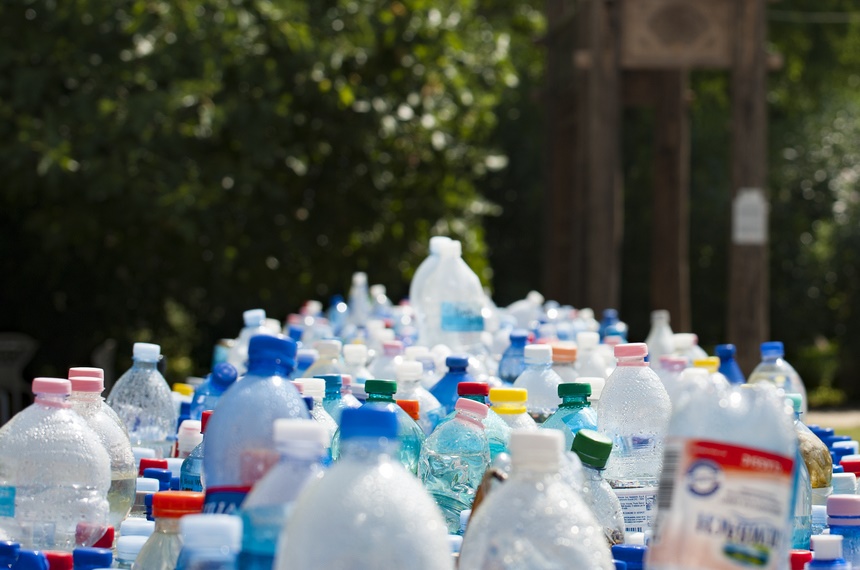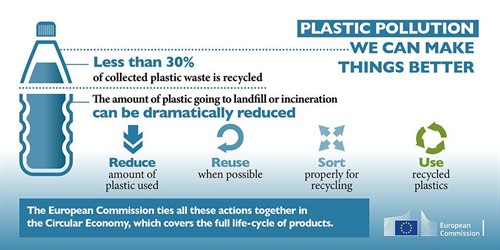
EU plan towards Circular Economy: the first-ever Europe-wide strategy on plastic
Every year, Europeans generate 25 million tonnes of plastic waste, but less than 30% is collected for recycling. Across the world, plastics make up 85% of beach litter. And plastics are even reaching citizens' lungs and dinner tables, with microplastics in air, water and food having an unknown impact on their health. Building on the Commission's past work, the new EU-wide strategy on plastics will tackle the issue head on.

In January 2018 the European Commission adopted the first-ever Europe-wide strategy to address plastic pollution whilst fostering growth and innovation, turning a challenge into a positive agenda for the Future of Europe. The new plastic strategy will transform the way products are designed, produced, used, and recycled in the EU. Too often the way plastics are currently produced, used and discarded fail to capture the economic benefits of a more circular approach. It harms the environment. The goal is to protect the environment whilst at the same time lay foundations to a new plastic economy, where the design and production fully respect reuse, repair and recycling needs and more sustainable materials are developed.
There is a strong business case for transforming the way products are designed, produced, used, and recycled in the EU. This plan gives the opportunity to take the lead in this transition, by creating new investment opportunities and jobs. Under the new plans, all plastic packaging on the EU market will be recyclable by 2030, the consumption of single-use plastics will be reduced and the intentional use of microplastics will be restricted.
Under the new strategy, the European Union will:
• Make recycling profitable for business: New rules on packaging will be developed to improve the recyclability of plastics used on the market and increase the demand for recycled plastic content. With more plastic being collected, improved and scaled up recycling facilities should be set up, alongside a better and standardised system for the separate collection and sorting of waste across the EU. This will save around a hundred euros per tonne collected. It will also deliver greater added value for a more competitive, resilient plastics industry.
• Curb plastic waste: European legislation has already led to a significant reduction in plastic bag use in several Member States. The new plans will now turn to other single-use plastics and fishing gear, supporting national awareness campaigns and determining the scope of new EU-wide rules to be proposed in 2018 based on stakeholder consultation and evidence. The Commission will also take measures to restrict the use of microplastics in products, and fix labels for biodegradable and compostable plastics.
• Stop littering at sea: New rules on port reception facilities will tackle sea-based marine litter, with measures to ensure that waste generated on ships or gathered at sea is not left behind but returned to land and adequately managed there. Also included are measures to reduce the administrative burden on ports, ships and competent authorities.
• Drive investment and innovation: The Commission will provide guidance for national authorities and European businesses on how to minimise plastic waste at source. Support for innovation will be scaled up, with an additional €100 million financing the development of smarter and more recyclable plastics materials, making recycling processes more efficient, and tracing and removing hazardous substances and contaminants from recycled plastics.
• Spur change across the world: As the European Union does its own homework, we will also work with partners from around the world to come up with global solutions and develop international standards. We will also continue to support others, as we have done with the clean-up of the Ganga River in India.
Next Steps
The new Directive on port reception facilities proposed today will now go to the European Parliament and Council for adoption.
Subject to Better Regulation requirements, the Commission will present the proposal on single-use plastics later in 2018.
The Commission will launch the work on the revision of the Packaging and Packaging Waste Directive and prepare guidelines on separate collection and sorting of waste to be issued in 2019.
For the full list of measures and their timeline, see the Annex to the Plastics Strategy here.
For More Information
A European Plastics Strategy: Questions & Answers
Proposal on Port Reception Facilities
Eurobarometer: SMEs and the circular economy
Author: Marco Matrisciano (Abis - The Academy of Business in Society)

Follow us on